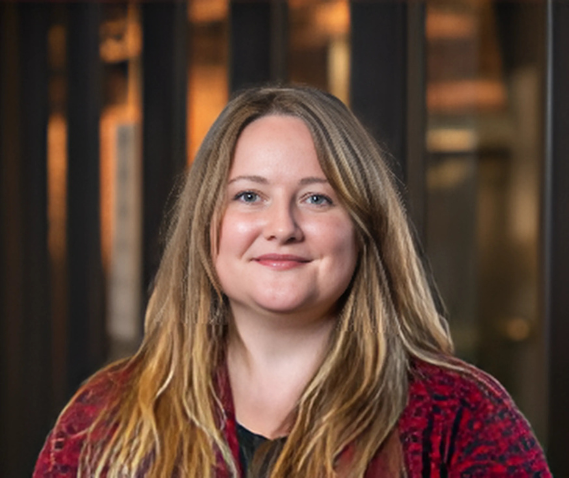PGY1 Pharmacy/PGY2
Residency Program Director
-

Liz Hall, PharmD, SMBA
- PGY2 Pharmacy Informatics Residency Program Director
- Assistant Director, Pharmacy Informatics
- PharmD, SMBA, The Ohio State University
Previous Year Residents
-
2025
Christopher Le, PharmD
Pursuing a position in Pharmacy Informatics -
2024
Michael Chiu, PharmD, BCPS
Pharmacist Informaticist-Ohio Health -
2023
Hina Afaq, PharmD, BCPS
Ambulatory Care Informatics Specialist - University of Texas Medical Branch Health
About the PGY1 Pharmacy/PGY2 Pharmacy Informatics Residency Program
Residency Sites
As one of America’s top ranked academic medical centers, the mission of The Ohio State University Wexner Medical Center (OSUWMC) is to improve people’s lives through innovation in research, education, and patient care. OS UWMC is a 1,506 bed multi-hospital delivery system recognized in 2018 as one of “America’s Best Hospitals” for excellence in ten specialties by US News and World Report based on quality, outcomes, and reputation.
UWMC is a 1,506 bed multi-hospital delivery system recognized in 2018 as one of “America’s Best Hospitals” for excellence in ten specialties by US News and World Report based on quality, outcomes, and reputation.
University Hospital (UH)
University Hospital (UH) is our flagship hospital with over 900 beds. UH is a major referral center for patients throughout Ohio and the Midwest, and is one of the busiest kidney and pancreas transplant centers in the world. UH is also an international center for neuromodulation research and neurological care. In addition, UH is a level 1 trauma center in addition to being the primary burn center for the region.
The James Cancer Hospital and Solove Research Institute
The OSUCCC – James strives to create a cancer-free world by integrating scientific research with excellence in education and patient-centered care — a strategy that leads to better methods of prevention, detection and treatment. Ohio State is one of 51 National Cancer Institute (NCI)-designated Comprehensive Cancer Centers and one of only a few centers funded by the NCI to conduct both phase I and phase II clinical trials on novel anticancer drugs sponsored by the NCI. As the cancer program’s 356-bed adult patient-care component, The James is one of the top cancer hospitals in the nation as ranked by U.S. News & World Report and has achieved Magnet® designation, the highest honor an organization can receive for quality patient care and professional nursing practice. With 21 floors and more than 1.1 million square feet, The James is a transformational facility that fosters collaboration and integration of cancer research and clinical cancer care.
The Ross Heart Hospital
The Ross Heart Hospital is a leader in cardiology and heart surgery and is the only nationally ranked heart hospital in the area. Each floor of the 150-bed hospital is dedicated to a specific service, which helps us provide specialized care for every patient. The Ross is one of the largest centers for the implantation of LVAD devices in the world in addition to providing heart and lung transplants.
University Hospitals East (UHE)
University Hospitals East (UHE) blends the friendly atmosphere of a community hospital with the advantages of being a part of a major academic medical center. Located on the eastern edge of downtown Columbus, University Hospital East offers renowned Ohio State services in orthopedic care, emergency services, cancer care, addiction services, ear, nose and throat care, heart care, radiology and imaging services, rehabilitation and wound healing.
Harding Hospital
In addition, the OSUWMC also boasts Harding Hospital, which offers comprehensive inpatient and outpatient mental and behavioral health services in addition to Dodd Hall which is a nationally recognized and accredited rehabilitation program specializing in stroke, brain, and spinal cord rehabilitation.
The Department of Pharmacy
The Department of Pharmacy at The OSUWMC is one of the largest in the country. With over 400 employees, and a practice model that includes both clinical pharmacy generalists and clinical pharmacy specialists, our goal is the provision of outstanding, state of the art care. We advise our staff on the best use of medications, develop safeguards for our patients to prevent medication errors and develop transformative pharmacy practice in health-systems.
We are guided in this mission by our strategic plan that focuses on five key priorities: become a practice model leader, optimizing efficiency and effectiveness, preventing patient harm by exceeding standards of medication safety, staff recognition, retention and engagement; and scholarship. Training future generations of pharmacists is a vital part of our mission. Our pharmacists serve as preceptors for our residency programs while providing experiential training for Doctor of Pharmacy (PharmD) students.
Our residency program has a 55-year tradition of excellence with our graduates being well-prepared to work at a high-level in a wide-variety of institutional and ambulatory patient care facilities. The Department of Pharmacy, in partnership with the Ohio State College of Pharmacy, strives to develop the skills of our residents and provide a residency program that is recognized nationally for the quality and excellence of its graduates.
The Brain and Spine Hospital
The Brain and Spine Hospital opened in the Fall of 2016 and is a state-of-the-art facility for the advanced management, care and healing of patients with neurological disorders.The hospital consists of 87 private beds and specialized units for stroke and neurovascular, neurotrauma, epilepsy, spine, chronic pain, neuromodulaton, multiple sclerosis, congnitive and movement disorders, as well as an innovative new model for acute spinal cord injuries.
Key Rotations/Experiences
PGY1:
Rotational experiences are designed to provide the resident with broad exposure to pharmacy services and patient populations. The rotation schedule will be tailored to each resident. Additional information can be found on the Post Graduate Year 1 Programs: Health-System page.
PGY2:
The resident becomes a core member of the Pharmacy Informatics team through structured rotation experiences and projects. The resident will be encouraged to participate freely and seek opportunities in their areas of interest.
The resident will complete a combination of rotations and longitudinal experiences designed around the core objectives specified by ASHP in addition to the resident’s interests. The following is a list of the subject matter covered:
- Orientation
- Informatics Fundamentals
- Information Technology and Automation
- Data Analytics
- Finance/340b
- Clinical Decision Support
- Project Management
- Leadership and Management
- Maintenance and Support
- Pharmacy Informatics and Medication Safety Administration
- Community Connect
- Pharmacy Operations: Acute Care, Infusion, Clinic-based practice, Outpatient pharmacy
Elective offerings may be customized according to the interests of the resident.
Teaching:
The resident will participate in the education of PharmD students enrolled at The Ohio State University through an IPPE precepting experience during the first residency year. The resident will deliver a Grand Rounds presentation for continuing education during both years of the program. The resident will complete a formal teaching and learning training program through the College of Pharmacy. There are also opportunities for layered learning with and through precepting for APPE students and PGY1 residents based on timing and resident interest. A teaching certificate program is available during the PGY1 year as an option for interested residents.
Service:
The resident will be assigned to participate in the Medication Safety team and additional committee work related to informatics.
Additional Experiences:
The resident will participate in a clinical on-call program during the PGY1 year and informatics on-call during the PGY2 year. Volunteering at the Columbus Free Clinic during both years is expected.
Preceptors
Simon Bae, PharmD
Clinical Applications Pharmacist
Andy Black, RPh, MISM
Pharmacy Manager, Informatics
Liz Hall-Link, PharmD
Pharmacy Manager-Informatics
Emily Konerman, PharmD
Clinical Applications Pharmacist Lead
John Mellett, PharmD, MBA
Clinical Applications Pharmacist Lead
Joseph Melucci, RPh, MBA
Director, Pharmacy Informatics
Scott West, PharmD, CPHIMS
Clinical Applications Pharmacist
Robert Wyatt, PharmD, MS
Clinical Applications Pharmacist
Rupal Parbhoo, PharmD, MBA, BCPS
Clinical Applications Pharmacist Lead
Anuj Thirwani, PharmD, MBA, BCPS
Clinical Applications Pharmacist Lead
Keith Young, PharmD, MS
Clinical Applications Pharmacist
David Wai, PharmD, MS, BCPS, 340B ACE
Clinical Applications Pharmacist
Selected Resident Research
All residents will undergo focused training in research through the Resident Research Series. Residents are required to devise, execute and assess a longitudinal project in each year as part of the ASHP standards (two projects total). The resident will be responsible for all aspects of the research project including: project development, IRB proposal (if necessary), data collection and analysis, presentation of the data, and manuscript preparation. These projects will either be presented at a Pharmacy Residency Conference, Great Lakes Pharmacy Residency Conference or (if accepted) at Epic’s XGM Conference. The resident will also have the opportunity to attend the ASHP Midyear Clinical Meeting. A project manuscript will be prepared suitable for external publication in a peer-reviewed journal.
- Defining, capturing, and validating pharmacists’ patient profile reviews in the electronic medical record Smith A, Begnoche B, Mellett J, Hafford A, Rodis JL, Jordan TA
- Detection of adverse drug events using an electronic trigger tool Lim D, Melucci J, Rizer MK, Prier B, Weber R
- Pharmacist-driven initiative for management of Staphylococcus aureus bacteremia using a clinical decision support system Wang F, Prier B, Mellett J, Bauer K
- Development and implementation of an automated method for the detection of drug-related acute kidney injury in hospital inpatients Pavlik A, Melucci j, Gonsenhauser I, Mellett J, Prier B
Benefits and Additional Requirements
Application Deadline:
January 2
Required Supplemental Material:
We welcome applications from non-U.S. citizens who have a “green card” (permanent resident status) or a current visa valid through the entire duration of the residency program. The Ohio State University pharmacy residency programs are NOT able to sponsor visas for pharmacy residents (PGY1 or PGY2).
Annual Salary:
PGY1: $55,000
PGY2: $56,000
Vacation Days:
10 days
Staffing Requirement:
PGY1: 24 weekends per year
PGY2: 19 weekends per year
Completion of a Major Research Project

